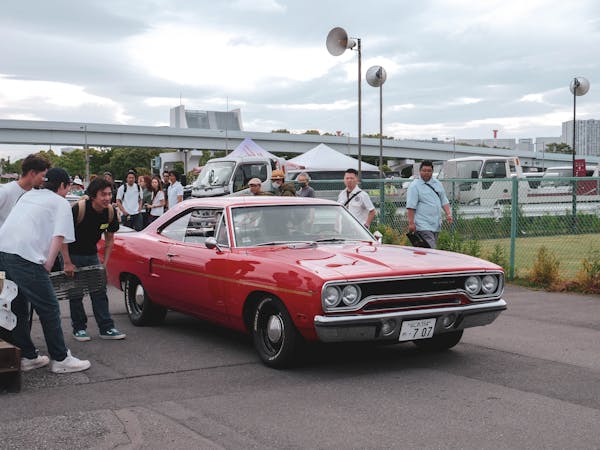Open roads have always held a unique charm in America, symbolizing freedom and independence deeply ingrained in our culture. From the early days of the Ford Model T, cars have shaped our landscapes, lifestyles, and even identities.
But as our love affair with automobiles has evolved, so has its impact on our roads and society. More cars lead to traffic congestion, which can cause drivers to be frustrated and impatient, leading to risky maneuvers and accidents. It even costs innocent lives. According to IIHS, 42,514 people were killed in motor vehicle crashes in 2022.
This blog post explores the car culture in America, examining its influence on everything from congestion and urban sprawl to societal attitudes.
The Rise of Car Culture in the US
America’s romance with the automobile began over a century ago, fueled by the advent of mass production and the iconic Ford Model T. Cars quickly transformed from luxury items to a symbol of progress, representing the American dream of upward mobility.
This love affair intensified after World War II, with the suburban boom further solidifying the car’s place as an essential part. There were only 25 million registered cars in 1950. This number quadrupled in 20 years, with 118 million cars running on roads by 1970. Spacious suburbs, designed around the automobile, sprawled outwards, creating a reliance on cars for commuting, shopping, and social activities.
The increasing number of vehicles on roads reflects this dependence on cars in modern America. According to Statista, around 3.12 million cars were sold in 2023, a testament to the deep-rooted car culture in America. From city streets to country roads, cars have become inseparable from American society, shaping our communities and influencing our daily lives.
The car has evolved from a mere means of transportation to an emblem of personal identity and status. This cultural significance is deeply rooted in American society, influencing everything from advertising and entertainment to urban planning and infrastructure development.
The Impact of Increasing Cars on Our Roads
The sheer number of cars on our roads has undeniable positive and negative consequences. Let’s explore the multifaceted impact of this automotive boom.
The Upside
It’s indisputable that the availability of cars has brought significant benefits to American society. A study highlights that 91% of adults travel to work in their vehicles. Cars have dramatically increased convenience, mobility, and accessibility. They’ve opened up opportunities for people to live further from their workplaces, access education and healthcare facilities, and explore new destinations.
Beyond economic benefits, cars offer personal freedom and convenience that have become synonymous with the American way of life. Whether it’s a road trip, a quick grocery run, or the daily commute, cars provide flexibility and autonomy that many value. They’ve empowered individuals to shape their schedules and routines, leading to greater independence and control over their lives.
The Downside
While cars have undeniably brought progress and convenience, their widespread use has also created various challenges that impact our society and environment. One of the most visible consequences is traffic congestion, costing billions in lost time and productivity.
According to the INRIX report, traffic congestion cost the U.S. $733 billion in 2023, up 15% from 2022. The constant stop-and-go traffic frustrates drivers and contributes to air pollution and increased fuel consumption.
Speaking of air pollution, the transportation sector, dominated by cars and trucks, significantly contributes to greenhouse gas emissions. According to the EPA, it accounts for 28% of the total emissions, whereas light-duty vehicles like passenger cars share 57%. These emissions have far-reaching consequences, impacting air quality, public health, and climate change.
Perhaps the most devastating consequence of car culture is the human cost. More cars on the road lead to congestion and rash driving, often leading to accidents. The NHTSA reports that 66% of accidents are attributed to aggressive driving, highlighting the risks associated with our reliance on automobiles.
A tragic incident in Atlanta serves as an example of the dangers of aggressive driving. In May 2024, a single-vehicle crash claimed the life of one person. Fox5Atlanta reported this incident where the vehicle was overturned, indicating a likely loss of control at high speed.
This Atlanta incident underscores the potential consequences of aggressive driving, leaving families shattered and lives irrevocably altered. If you or a loved one has been affected by a car accident in Atlanta, involving aggressive driving, it’s crucial to seek legal guidance.
An experienced Atlanta car accident lawyer can help navigate the complexities of such cases. They will protect your rights, and you receive the compensation you deserve.
Atlanta Personal Injury Law Firm highlights the critical roles of a car accident lawyer, including, but not limited to:
- Negotiating for settlement
- Legal claims on behalf of the client
- Educating clients on their rights
- Organizing paperwork and gathering evidence
Societal Attitudes Towards Cars
The perception of cars is undergoing a subtle yet significant transformation. Once seen as a symbol of success and independence, particularly for older generations, younger Americans are questioning the necessity of car ownership.
For them, a car might be more of a luxury than a must-have, especially in urban areas with robust public transportation. This generational divide reflects a shift in priorities, with many young people prioritizing experiences and financial flexibility over traditional status markers.
Furthermore, the growing awareness of climate change and environmental concerns drives a shift towards more sustainable transportation options. Rising electric vehicle sales underscore this trend. Consumers are seeking ways to reduce their carbon footprint, and electric cars, with their zero tailpipe emissions, offer a promising solution.
While cars are still essential, changing attitudes suggest that car ownership may become less universal in the future. This shift in perspective highlights the growing importance of sustainable transportation solutions and a more mindful approach to car ownership and use.
FAQs
What is car culture?
Car culture refers to a society or way of life heavily influenced by automobiles. It encompasses how cars shape people’s behaviors, attitudes, and values, often emphasizing personal freedom, mobility, and convenience. Car culture is evident in urban planning, infrastructure development, and even leisure activities centered around driving.
What was the impact of the rise of car culture?
The rise of car culture dramatically transformed societies worldwide. It increased personal mobility, fueled suburban growth, and created new industries. However, it also led to traffic congestion, environmental pollution, and decreased public transportation use.
How does the car evolve today?
Today, cars are evolving towards electrification, connectivity, and autonomy. Electric vehicles are gaining popularity due to environmental concerns and advancements in battery technology. Connectivity transforms cars into mobile hubs, with features like integrated infotainment systems and vehicle-to-vehicle communication.
In the end, this journey begins with each of us. We must reflect on our driving habits and their impact on our communities and the environment. We should choose alternative modes of transportation whenever possible, practice safe driving, and support policies that promote sustainable infrastructure. Our choices today will determine the future we create, so let’s choose wisely.




